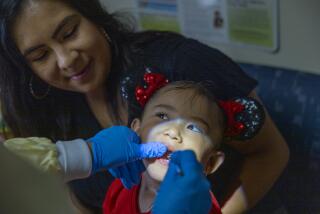Oral Care Now Saves Teeth Later
- Share via
Today, the average American over the age of 65 has approximately 18 original teeth.
By 2000, it’s projected that seniors will retain 24 natural teeth due to better awareness of good oral health care.
No matter what a person’s age, conscientious oral care will prevent oral health problems commonly thought of as natural characteristics of aging.
Nowadays, as baby boomers enter their golden years, health care for seniors is getting more attention. Oral health care is being covered in newspapers and magazines and on television with increasing frequency. Studies indicate, however, that older adults’ knowledge about oral health is lower than that of other age groups.
As a result, many elderly experience tooth loss, cavities, dry mouth and gum disease unnecessarily. By practicing proper oral hygiene and getting regular professional checkups, seniors can avoid the oral health problems commonly associated with aging.
Following are a few tips to help seniors develop good oral health care habits for healthy teeth and gums:
Brushing
* Use a soft, nylon toothbrush with round-ended bristles and a fluoride toothpaste.
* Position the bristles at a 45-degree angle to contact both the tooth surface and the gum line.
* Gently brush the front, side, back and chewing surfaces of the teeth using back and forth rolling motions.
* Tilt brush vertically behind the front teeth and stroke up and down with the front half of the brush.
* Brush the tongue from the back to front to remove odor-producing bacteria.
* Remember to brush for at least two to three minutes. (Tip: Hum one of your favorite songs as you brush as an easy way to time yourself.)
Flossing
* Wrap an 18-inch piece of floss around the third finger of each hand.
* Hold approximately an inch of floss tightly between the thumb and forefinger of each hand.
* Keeping the floss taut, work it between the teeth. Then wrap the floss around each tooth and gently rub up and down.
* Use a clean section of floss as it becomes soiled or frayed.
*
For seniors who wear full or partial dentures, oral hygiene routines require more care:
* Remember to brush dentures daily with a soft, nylon toothbrush with round-ended bristles.
* Use commercially prepared denture powder or paste, or baking soda. Never use toxic or abrasive household cleaning products.
* Before brushing, fill the sink halfway with warm water. Place a washcloth in the bottom of the sink for protection in case dentures fall.
* Brush the inside and outside surfaces and rinse with cold water.
* Brush remaining natural teeth and gums, especially the ones supporting a partial denture.
* When not in use, cover dentures with water or a denture-cleaning solution to prevent drying.
*
For seniors with arthritis or limited flexibility in the hand or wrist, the following tips are designed to make brushing and flossing easier:
* For more comfortable handling of the toothbrush, insert the brush into a rubber ball, sponge hair curler or bicycle grip.
* For a better grip, attach a wide elastic band to the toothbrush.
* An electronic or sonic toothbrush and dental floss holder can also alleviate some strain when brushing and flossing.
* The writer is president of the American Dental Hygienists’ Assn.
*
For more information, visit the ADHA Web page at https://www.adha.org or call (800) 847-6718.




